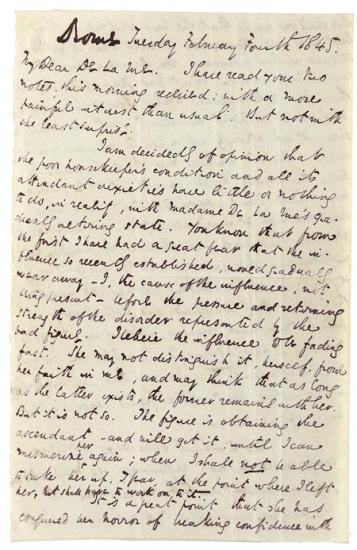
Autograph letter signed, Rome, 31 January 1845, to Emile de la Rue
Purchased in 1968
For several years prior to first meeting Dickens in 1844, Madame de la Rue had suffered from such generalized symptoms as insomnia, headaches, nervous tics, and convulsions. Over the course of his numerous mesmeric sessions, Dickens concluded that she was haunted by an evil phantom, alternately referred to in his detailed and extensive letters to her husband as "the bad figure," "Bad Spirit, "this creature," or "the shadow." Dickens came to believe that he was engaged in a powerful struggle with "this Phantom" for control of the "mind and body" of Madame de la Rue. In this letter he asserts confidence in his mesmeric abilities: "Pursuing that Magnetic power, and being near to her and with her, I believe that I can shiver it [the phantom] like Glass."
Mesmerism
In his life and art, Dickens worked energetically for healing. His fiction exposed many of the social ills of his day, and a significant portion of his later journalism is devoted to an impassioned campaign to improve sanitation and public health. Although he was a committed evolutionist and progressive in his attitude toward science and the improvements wrought by technological advances, he was also, by imagination and temperament, attracted to the fantastic and pseudoscientific. This was manifested in his interest in spontaneous combustion and phrenology as well as his fervent belief and active experiments in mesmerism (or "animal magnetism"), an early type of hypnotism.
Dickens was introduced to mesmerism through Dr. John Elliotson, his family physician and one of his "most intimate and valued friends." He became convinced of the therapeutic effects of mesmerism after witnessing Elliotson's demonstrations in 1838, and, although there is no record of Dickens undergoing the procedure, he learned to mesmerize others. Throughout the 1840s, he conducted mesmeric experiments on his wife and friends.
My Dear De La Rue. I have read your two notes; this morning received; with a more painful interest than usual. But not with the least surprise.
I am decidedly of opinion that the poor housekeeper's condition and all its attendant anxieties have little or nothing to do, in reality, with Madame De La Rue's gradually altering state. You know that from the first I have had a great fear that the influence so recently established, would gradually wear away—I, the cause of the influence, not being present—before the pressure and returning strength of the disorder represented by the bad figure. I believe the influence to be fading fast. She may not distinguish it, herself, from her faith in me, and may think that as long as the latter exists, the former remains with her. But it is not so. The figure is obtaining the ascendant—and will get it, until I can mesmerize her again; when I shall not be able to take her up, I fear, at the point where I left her, but shall have to work on to it.
It is a great point that she has conquered her horror of breaking confidence with
